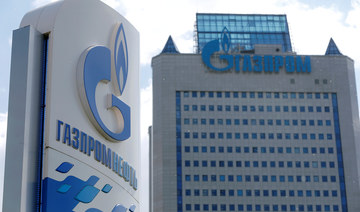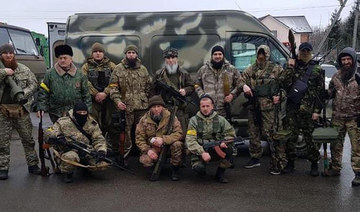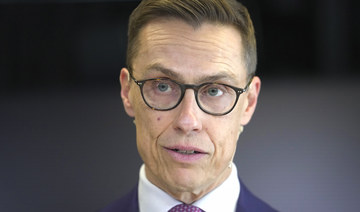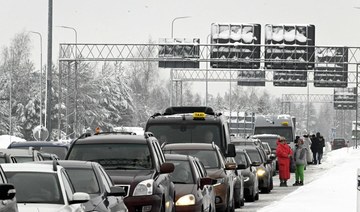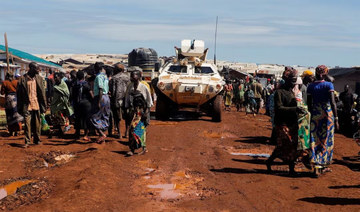GROZNY: Chechen President Ramzan Kadyrov has expressed support for Russian President Vladimir Putin’s signing of the independence documents of the Ukrainian provinces of Donetsk and Luhansk, as well as his launch of a “military operation” in Ukraine.
He hailed Putin’s signing of the independence documents of Donetsk and Luhansk as a historic decision that will put an end to the bloodshed and violence that 4 million people have been subjected to in the two provinces for eight years.
In an opinion article for Arabic news website Al-Ain published on Tuesday, Kadyrov added that the Chechen people welcome citizens of the two independent and recognized republics of Donetsk and Luhansk.
The article also included his views on international events, why Chechen forces joined the conflict in Ukraine, and claims that there were Nazis in the country.
“It gives me great pain to face the fact that the brotherly and dear Ukrainian people find themselves, after several decades, in the same tragedy that we, only a short time ago, were able to overcome,“ Kadyrov wrote.
He added: “The Chechen people have experienced a whole arsenal of malicious and cunning actions of the West. We were engaged, without realizing, in an imaginary adventure that claimed the lives of hundreds of thousands of people. The West used our people in an attempt to destroy Russia.”
Kadyrov said that with Putin’s help the Chechen people “managed to repel the enemies of the country and the people and established a solid peace in the region.”
On Ukraine, Kadyrov said: “Since the 1940s, there was an organization of Ukrainian ultra-nationalists led by Stepan Bandera, and immediately after the collapse of the Soviet Union, their ideological followers, who had been there all this time, began to pursue an accelerated anti-Russian policy. Russophobia became a national idea, and at the same time, Ukraine continued to receive loans, energy sources at below-market prices and all kinds of concessions from Russia.”
He added: “The liberal West turned a blind eye to all this, and anti-Russian campaigns continued steadily and systematically, becoming more complex from year to year, as they were lauded by liberal Europe and the US. Ukrainian Nazis of various stripes, including those who were on the side of international terrorists, fought in Chechnya, and contributed to the killing of defenders of its honor and freedom.”
The Chechen leader referred to the secret document that he revealed last year and is kept in the British National Archives, saying: “This document is still classified as ‘secret’, but there is no secret that will not be revealed at some point. It turned out that this document is the minutes of a meeting between the heads of the foreign affairs agencies of the US, Britain and the Federal Republic of Germany, which was held in the German city of Bonn on March 6, 1991.”
He said that the released minutes “reveal a serious contradiction in the history that the West has long promoted. It turned out that NATO, the military alliance of the Western countries, during negotiations on the unification of the Federal Republic of Germany and the German Democratic Republic into a single German state, made a clear promise to the head of the Soviet state of NATO’s strategic military undertaking not to extend its influence to the countries of Eastern Europe on the other side of the Oder river.”
Kadyrov said that the US diplomat Raymond Seitz clearly stated: “We have made clear to the Soviet Union that we do not intend to reap any benefits from the withdrawal of Soviet forces from Eastern Europe, and NATO should not expand to the east, either officially or unofficially.”
He said that the same position was shared by the representative of the German Foreign Ministry, Jurgen Chrobog, who stated that “during the 2 + 4 negotiations (on Germany’s post-unification situation), we made it clear that NATO would not expand to the east. Thus, we cannot propose to Poland and others to join NATO.”
Kadyrov said that this promise was repeatedly violated by all the countries that took part in the meeting referred to in the protocol.
In his article, Kadyrov recounted events in Ukraine in recent years, beginning with the 2014 coup.
“In 2014, as a result of an unconstitutional armed coup (the so-called “Maidan”) with the support of the West, ultra-nationalists came to power. In the same year, real Nazi massacres began, riots broke out in Odessa in the city center, and in the same year, 2014, two regions of Ukraine (which are historically two Russian regions), the People’s Republics of Donetsk and Luhansk, opposed the authority of ultra-nationalists, and as a result of the referendum, the majority of the population voted in favor of independence.
“Since then, the continuous bombing of these areas has included shelling with missiles and bombs, which resulted in the deaths of about 13,000 people, according to the Organization for Security and Cooperation in Europe. Yet, the US and Europe looked indifferently at this ongoing humanitarian catastrophe.”
He added: “Throughout the years of war in the Donbas region, the Ukrainian army and ultra-nationalist battalions (Azov and Aidar), which are not actually under official authority, were supplied with weapons by the US and NATO countries. Ukraine was simply overflowing with Western weapons.
“For eight long years, such crimes against the residents of the Lugansk People’s Democratic Republic were committed by official Kyiv, and the government did not make a single attempt to stop the bullying of people they considered their own citizens.”
Kadyrov also referred to the issue of Ukrainian nuclear weapons and said: “Recently, officials in Ukraine, in general, have made explicit threats to produce nuclear weapons, and Volodymyr Zelensky announced plans to withdraw from the Budapest Memorandum that prevented Ukraine from acquiring nuclear weapons.
“These intentions are disclosed at a time when Ukraine has enough capabilities and means to make a so-called ‘dirty bomb,’ at least. In the event of the emergence of nuclear weapons in Ukraine, the time it takes for the missiles to reach Moscow is reduced to only about four minutes. During this time, it is impossible to ward off the attack.”
The Chechen president endorsed his Russian counterpart’s decision to launch a military operation in Ukraine, saying: “Because of these factors that pose a threat to the strategic security of our country, the Russian president took not only the completely natural and right decision but the only correct decision, the recognition of the People’s Republics of Luhansk and Donetsk, and the launch of a special military operation to remove the weapons of Ukraine and uproot Nazism from it. In this way, Russia prevented the inevitable strike that NATO planned to inflict on the Russian lands at the hands of Ukraine.”
He added: “Russia does not set itself the goal of occupying Ukraine. It is the people of Ukraine who will determine their destiny without the participation of neo-Nazis and in isolation from Western influence. Russia adheres to this policy all over the world, in relation to any state. It defends the rights of nations to self-determination.”




